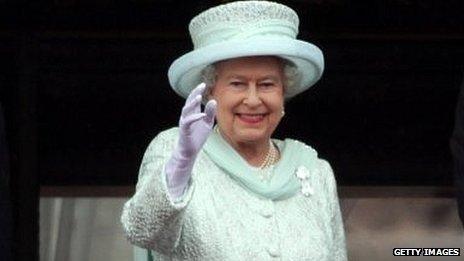Queen Elizabeth II's calm reign key to her success
- Published
- comments

The Queen's popularity among the general British public continues to hold steady
Each Jubilee - Silver, Golden and now Diamond - offers an opportunity to pause and reflect on a central question.
Why has an institution abandoned in country after country through the ages, survived and prospered here?
Biographers have already staked their claim to the answer. Historians will offer a better perspective. But even without their advantage, it's obvious Elizabeth has been critical to the success of the House of Windsor.
In public, she appears sensible, pragmatic, occasionally glum-looking, ever careful not to cause offence. In private, her friends say, she's humble and a great mimic.
In her evolving world, which has encountered the Sex Pistols and civil partnerships, the Queen and the monarchy she only inherited because her uncle chose love over duty has moved slowly, often imperceptibly with the times.
As one who knows her put it to me once - you don't want a monarch who fizzes like a Catherine wheel.
The non-fizzy, non-showy sovereign of 60 years enjoys the solid, increasingly affectionate support of the majority of the population.
These past few days have been an opportunity for them to make that abundantly clear.
Many, many of them have known no other head of state. A minority of the population yearn for no such head of state. They want the individual chosen by the ballot box, not an accident of birth.
When other public bodies have been battered and bruised, the current, comfortable status quo is not a bad position for Elizabeth II, the 40th hereditary monarch since William the Conqueror, to occupy and indeed savour.